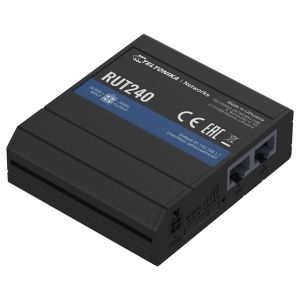RUT240
Overview
RUT240 is an all-time bestseller industrial 4G LTE Wi-Fi router for professional M2M & IoT applications. It delivers high performance for mission-critical cellular communication in rigorous environments. RUT240 is widely used for 4G backup, Remote Connection, Advanced VPN, and tunneling services in IoT networking solutions. WAN failover ensures automatic switch to alternative backup connection in case of any connectivity issues. The Wi-Fi is functional in both: Access point and Station mode at the same time.
Features
| Mobile |
|
| Mobile module |
4G (LTE) – Cat 4 up to 150 Mbps, 3G – Up to 42 Mbps, 2G – Up to 236.8 kbps |
| Status |
Signal strength (RSSI), SINR, RSRP, RSRQ, EC/IO, RSCP, Bytes sent/received, connected band, IMSI, ICCID |
| SMS |
SMS status, SMS configuration, send/read SMS via HTTP POST/GET, EMAIL to SMS, SMS to EMAIL, SMS to HTTP, SMS to SMS, scheduled SMS, SMS autoreply, SMPP |
| Black/White list |
Operator black/white list |
| Band management |
Band lock, Used band status display |
| APN |
Auto APN |
| Bridge |
Direct connection (bridge) between mobile ISP and device on LAN |
| Passthrough |
Router assigns its mobile WAN IP address to another device on LAN |
| Multiple PDN (optional) |
Possibility to use different PDNs for multiple network access and services (not available in standard FW) |
|
Wireless
|
|
| Wireless mode |
IEEE 802.11b/g/n, Access Point (AP), Station (STA) |
| WiFi security |
WPA2-Enterprise - PEAP, WPA2-PSK, WEP, WPA-EAP, WPA-PSK; AES-CCMP, TKIP, Auto Cipher modes, client separation |
| SSID |
SSID stealth mode and access control based on MAC address |
| WiFi users |
Up to 50 simultaneous connections |
| Wireless Hotspot |
Captive portal (Hotspot), internal/external Radius server, built in customizable landing page |
|
Ethernet
|
|
| WAN |
1 x WAN port (can be configured to LAN) 10/100 Mbps, compliance with IEEE 802.3, IEEE 802.3u standards, supports auto MDI/MDIX |
| LAN |
1 x LAN port, 10/100 Mbps, compliance with IEEE 802.3, IEEE 802.3u standards, supports auto MDI/MDIX |
|
Network
|
|
| Routing |
Static routing, Dynamic routing (BGP, OSPF v2, RIP v1/v2, RIPng, OSPF6) |
| Network protocols |
TCP, UDP, IPv4, IPv6, ICMP, NTP, DNS, HTTP, HTTPS, FTP, SMTP, SSL v3, TLS, ARP, VRRP, PPP, PPPoE, UPnP, SSH, DHCP, Telnet client, SNMP, MQTT, Wake On Lan (WOL) |
| VoIP passthrough support |
H.323 and SIP-alg protocol NAT helpers, allowing proper routing of VoIP packets |
| Connection monitoring |
Ping Reboot, Wget Reboot, Periodic Reboot, LCP and ICMP for link inspection |
| Firewall |
Port forward, traffic rules, custom rules |
| DHCP |
Static and dynamic IP allocation, DHCP Relay, Relayd |
| QoS / Smart Queue Management (SQM) |
Traffic priority queuing by source/destination, service, protocol or port, traffic priority queuing by source/destination, service, protocol or port, WMM, 802.11e |
| DDNS | Supported >25 service providers, others can be configured manually |
| Network backup |
VRRP, Mobile, Wired and WiFi WAN options, each of which can be used as backup, using automatic Failover |
| Load balancing |
Balance your internet traffic over multiple WAN connections |
| SSHFS (optional) |
Possibility to mount remote file system via SSH protocol (not available in standard FW) |
|
Security
|
|
| Authentication |
Pre-shared key, digital certificates, X.509 certificates |
| Firewall |
Pre-configured firewall rules can be enabled via WebUI, unlimited firewall configuration via CLI; DMZ; NAT; NAT-T |
| Attack prevention |
DDOS prevention (SYN flood protection, SSH attack prevention, HTTP/HTTPS attack prevention), port scan prevention (SYN-FIN, SYN-RST, X-mas, NULL flags, FIN scan attacks) |
| VLAN |
Port and tag based VLAN separation |
| Mobile quota control |
Set up custom data limits for the SIM card |
| WEB filter |
Blacklist for blocking out unwanted websites, whitelist for specifying allowed sites only |
| Access control |
Flexible access control of TCP, UDP, ICMP packets, MAC address filter |
|
VPN
|
|
| OpenVPN |
Multiple clients and server can be running simultaneously, 12 encryption methods |
| OpenVPN Encryption |
DES-CBC, RC2-CBC, DES-EDE-CBC, DES-EDE3-CBC, DESX-CBC, BF-CBC, RC2-40-CBC, CAST5-CBC, RC2-64-CBC, AES-128-CBC, AES-192-CBC, AES-256-CBC |
| IPsec |
IKEv1, IKEv2, supports up to 4 x VPN IPsec tunnels (instances), with 5 encryption methods (DES, 3DES, AES128, AES192, AES256) |
| GRE |
GRE tunnel |
| PPTP, L2TP |
Client/Server services can run simultaneously |
| Stunnel |
Proxy designed to add TLS encryption functionality to existing clients and servers without any changes in the programs' code |
| SSTP |
SSTP client instance support |
| ZeroTier |
ZeroTier VPN |
| WireGuard |
WireGuard VPN client and server support |
|
Modbus
|
|
|
Modbus TCP Slave
|
|
| ID filtering |
Respond to one ID in range [1;255] or any |
| Allow Remote Access |
Allow access through WAN |
| Custom registers |
MODBUS TCP custom register block requests, which read/write to a file inside the router, and can be used to extend MODBUS TCP Slave functionality |
|
Modbus TCP Master
|
|
| Supported functions |
01, 02, 03, 04, 05, 06, 15, 16 |
| Supported data formats |
8 bit: INT, UINT; 16 bit: INT, UINT (MSB or LSB first); 32 bit: float, INT, UINT (ABCD (big-endian), DCBA (little-endian), CDAB, BADC) |
|
Modbus Data to Server
|
|
| Protocol |
HTTP(S), MQTT, Azure MQTT |
|
MQTT Gateway
|
|
| MQTT gateway |
Allows sending commands and receiving data from MODBUS Master through MQTT broker |
|
Monitoring & Management
|
|
| WEB UI |
HTTP/HTTPS, status, configuration, FW update, CLI ,troubleshoot, event log, system log, kernel log |
| FOTA |
Firmware update from sever, automatic notification |
| SSH |
SSH (v1, v2) |
| SMS |
SMS status, SMS configuration, send/read SMS via HTTP POST/GET |
| Call |
Reboot, Status, WiFi on/off, Mobile data on/off, Output on/off |
| TR-069 |
OpenACS, EasyCwmp, ACSLite, tGem, LibreACS, GenieACS, FreeACS, LibCWMP, Friendly tech, AVSystem |
| MQTT |
MQTT Broker, MQTT publisher |
| SNMP |
SNMP (v1, v2, v3), SNMP trap |
| JSON-RPC |
Management API over HTTP/HTTPS |
| MODBUS |
MODBUS TCP status/control |
| RMS |
Teltonika Remote Management System (RMS) |
|
IoT Platforms
|
|
| Cloud of Things |
Allows monitoring of: Device data, Mobile data, Network info, Availability |
| ThingWorx |
Allows monitoring of: WAN Type, WAN IP Mobile Operator Name, Mobile Signal Strength, Mobile Network Type |
| Cumulocity |
Allows monitoring of: Device Model, Revision and Serial Number, Mobile Cell ID, ICCID, IMEI, Connection Type, Operator, Signal Strength, WAN Type and IP |
| Azure IoT Hub |
Can send device IP, Number of bytes send/received/ 3G connection state, Network link state, IMEI, ICCID, Model, Manufacturer, Serial, Revision, IMSI, Sim State, PIN state, GSM signal, WCDMA RSCP WCDMA EC/IO, LTE RSRP, LTE SINR, LTE RSRQ, CELL ID, Operator, Operator number, Connection type, Temperature, PIN count to Azure IoT Hub server |
|
System Characteristics
|
|
| CPU |
Atheros Hornet, MIPS 24Kc, 400 MHz |
| RAM |
64 MB, DDR2 |
| FLASH storage |
16 MB, SPI Flash |
|
Firmware / Configuration
|
|
| WEB UI |
Update FW from file, check FW on server, configuration profiles, configuration backup, restore point |
| FOTA |
Update FW/configuration from server |
| RMS |
Update FW/configuration for multiple devices |
| Keep settings |
Update FW without losing current configuration |
|
Firmware Customization
|
|
| Operating system |
RutOS (OpenWrt based Linux OS) |
| Supported languages |
Busybox shell, Lua, C, C++ |
| Development tools |
SDK package with built environment provided |
|
Input/Output
|
|
| Input |
1 x Digital input, 0 - 6 V detected as logic low, 8 - 30 V detected as logic high |
| Output |
1 x Digital open collector output, max output 30 V, 300 mA |
| Events |
SMS, EMAIL, RMS |
|
Power
|
|
| Connector |
4 pin industrial DC power socket |
| Input voltage range |
9 – 30 VDC, reverse polarity protection, surge protection >33 VDC 10us max |
| PoE (passive) |
Passive PoE over spare pairs (available from HW revision 0007 and batch number 0010). Possibility to power up through LAN port, not compatible with IEEE802.3af, 802.3at and 802.3bt |
| Power consumption |
< 6.5 W Max |
|
Physical Interfaces (Ports, Led's, Anntenas, Buttons, Sim)
|
|
| Ethernet |
2 x RJ45 ports, 10/100 Mbps |
| I/O’s |
1 x Digital Input, 1 x Digital Output on 4 pin power connector |
| Status LEDs |
3 x Connection type status LEDs, 5 x Connection strength LEDs, 2 x LAN status LEDs, 1 x Power LED |
| SIM |
1 x SIM slot (Mini SIM – 2FF), 1.8 V/3 V, external SIM holder |
| Power |
1 x 4 pin DC connector |
| Antennas |
2 x SMA for LTE, 1 x RP-SMA for WiFi antenna connectors |
| Reset |
Reboot/Factory reset button |
|
Physical Specifications
|
|
| Casing material |
Aluminium housing with DIN rail mounting option, plastic panels |
| Dimensions (W x H x D) |
83 x 25 x 74 mm |
| Weight |
125 g |
| Mounting options |
Bottom and sideways DIN rail mounting slots |
|
Operating Environment
|
|
| Operating temperature |
-40 °C to 75 °C |
| Operating humidity |
10% to 90% non-condensing |
| Ingress Protection Rating |
IP30 |
|
Regulatory & Type Approvals
|
|
| Regulatory |
CE/RED, FCC, IC/ISED, EAC, RCM, PTCRB, RoHS, WEEE, Wi-Fi Certified, CCC, Anatel, GCF, REACH, Thailand NBTC, Ukraine UCRF, SDPPI (POSTEL) |
| Operator |
Verizon, AT&T |
| Vehicle |
ECE R10 (E-mark) |
|
EMI Immunity
|
|
| Standards |
Draft EN 301 489-1 V2.2.0, Draft EN 301 489-17 V3.2.0, Draft EN 301 489-52 V1.1.0 FCC 47 CFR Part 15B (2017), ANSI C63.4 (2014) |
| ESD |
EN61000-4-2:2009 |
| RS |
EN 61000-4-3:2006 + A1:2008 + A2:2010 |
| EFT |
EN 61000-4-4:2012 |
| Surge immunity (AC Power Line) |
EN 61000-4-5:2006 |
| Surge immunity (Ethernet ports) |
EN 61000-4-5:2014, clause 7.1 of ITU-T K21 |
| CS |
EN 61000-4-6:2009 |
| DIP |
EN 61000-4-11:2004 |
|
RF
|
|
| Standards |
EN 300 328 V2.1.1, EN 301 511 V12.5.1, EN 301 908-1 V11.1.1, EN 301 908-2 V11.1.1, EN 301 908-13 V11.1.1 FCC 47 CFR Part 15C (2017), FCC 47 CFR Part 2 (2017), FCC 47 CFR Part 22H (2017), FCC 47 CFR Part 24E (2017), FCC 47 CFR Part 27C (2017) RSS-Gen Issue 4 (2014), RSS-247 Issue 2 (2017), RSS-132 Issue 3 (2013), RSS-133 Issue 6 (2013), RSS-139 Issue 3, RSS-130 Issue 1 AS/CA S042.1:2018, AS/ACIF S042.3:2005, AS/CA S042.4:2018, AS/NZS 4268:2017 |
|
Safety
|
|
| Standards |
IEC 60950-1:2005 (Second Edition) + Am 1:2009 + Am 2:2013 AS/NZS 60950.1:2015 EN 50665:2017, EN 62311:2008 FCC 47 CFR Part 1 1.1310 RSS-102 Issue 5 (2015) |
Resources

